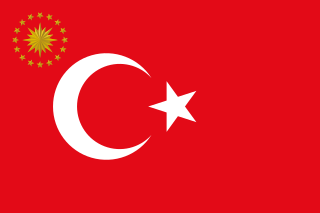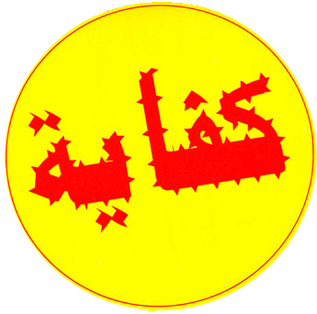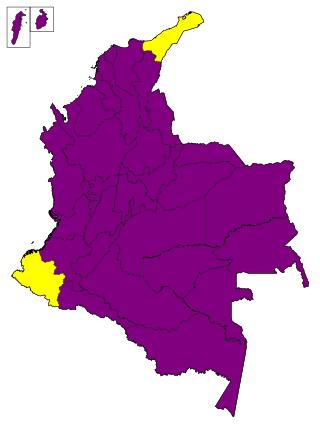| This article is part of a series on the |
| Politics of Colombia |
|---|
 |
Parliamentary elections were held in Colombia on 11 March 1990 alongside local elections and an unofficial referendum on electing a Constitutional Assembly. [1] [2]
| This article is part of a series on the |
| Politics of Colombia |
|---|
 |
Parliamentary elections were held in Colombia on 11 March 1990 alongside local elections and an unofficial referendum on electing a Constitutional Assembly. [1] [2]
After the murder of presidential candidate Luis Carlos Galán in August 1989, students started a movement calling for a referendum "for peace and democracy" to be held on 21 January 1990. However, under pressure from drug cartels, the government rejected the proposal. The students then set up the "We can still save Colombia" movement, which called for a referendum alongside the general elections on 11 March 1990 on establishing a Constitutional Assembly.
Whilst the referendum campaign remained unofficial, it was encouraged by the Ministry of Government. Voters cast votes with six ballots for various levels of government. The campaign encouraged them to add a seventh ballot, "la séptima papeleta", with their referendum vote on it. [3]
The campaign was marked by violence from left- and right-wing paramilitary groups linked to drug cartels. Several politicians were killed. Two days before the election the 19th of April Movement signed a peace treaty with the government and participated in the elections. [1]
| Party | Votes | % | Seats | +/– | |
|---|---|---|---|---|---|
| Colombian Liberal Party | 4,470,853 | 58.54 | 66 | +8 | |
| Social Conservative Party | 2,383,363 | 31.21 | 38 | –5 | |
| Conservative National Movement | 147,953 | 1.94 | 1 | New | |
| Colombian Communist Party | 35,274 | 0.46 | 0 | New | |
| Metapolitical Unitary Movement | 23,264 | 0.30 | 0 | New | |
| National Popular Alliance | 492 | 0.01 | 0 | New | |
| Coalitions of parties | 358,246 | 4.69 | 7 | – | |
| Other parties | 207,458 | 2.72 | 2 | – | |
| Blank votes | 10,242 | 0.13 | – | – | |
| Total | 7,637,145 | 100.00 | 114 | 0 | |
| Valid votes | 7,637,145 | 99.78 | |||
| Invalid votes | 17,005 | 0.22 | |||
| Total votes | 7,654,150 | 100.00 | |||
| Registered voters/turnout | 13,793,566 | 55.49 | |||
| Source: Nohlen [4] | |||||
| Party | Votes | % | Seats | +/– | |
|---|---|---|---|---|---|
| Colombian Liberal Party | 4,500,985 | 59.12 | 119 | +21 | |
| Social Conservative Party | 2,381,898 | 31.28 | 62 | –18 | |
| Conservative National Movement | 148,046 | 1.94 | 3 | New | |
| Patriotic Union | 26,682 | 0.35 | 1 | –2 | |
| Metapolitical Unitary Movement | 22,571 | 0.30 | 0 | New | |
| National Popular Alliance | 601 | 0.01 | 0 | New | |
| Coalitions of parties | 301,659 | 3.96 | 10 | – | |
| Other parties | 219,951 | 2.89 | 4 | – | |
| Blank votes | 11,220 | 0.15 | – | – | |
| Total | 7,613,613 | 100.00 | 199 | 0 | |
| Valid votes | 7,613,613 | 99.76 | |||
| Invalid votes | 18,081 | 0.24 | |||
| Total votes | 7,631,694 | 100.00 | |||
| Registered voters/turnout | 13,793,566 | 55.33 | |||
| Source: Nohlen | |||||
| Choice | Votes | % |
|---|---|---|
| For | 2,235,493 | 95 |
| Against | 117,000 | 5 |
| Invalid/blank votes | – | |
| Total | 100 | |
| Registered voters/turnout | ||
| Source: Direct Democracy | ||
Following the unofficial referendum, President Virgilio Barco Vargas issued decree 927 on 3 May calling for a referendum on electing a Constitutional Assembly alongside the presidential elections on 27 May. Although this was in violation of article 218 of the constitution, which gave Congress sole rights to reform the constitution, the referendum was approved by the Supreme Court. [5] The Assembly was elected in December 1990, and produced the 1991 constitution.

The politics of Kazakhstan takes place in the framework of a semi-presidential republic, whereby the President of Kazakhstan is head of state and nominates the head of government. Executive power is exercised by the government. Legislative power is vested in both the government and the two chambers of parliament.

The president of Turkey, officially the president of the Republic of Türkiye, is the head of state and head of government of Turkey. The president directs the executive branch of the national government and is the commander-in-chief of the Turkish military. The president also heads the National Security Council.

César Augusto Gaviria Trujillo is a Colombian economist and politician who served as the President of Colombia from 1990 to 1994, Secretary General of the Organization of American States from 1994 to 2004 and National Director of the Colombian Liberal Party from 2005 to 2009. During his tenure as president, he summoned the Constituent Assembly of Colombia that enacted the Constitution of 1991.

Elections in Venezuela are held at a national level for the President of Venezuela as head of state and head of government, and for a unicameral legislature. The President of Venezuela is elected for a six-year term by direct election plurality voting, and is eligible for re-election. The National Assembly (Asamblea Nacional) has 277 members (diputados), elected for five-year terms using a mixed-member majoritarian representation system. Elections also take place at state level and local level.

The Constitution of the Bolivarian Republic of Venezuela is the current and twenty-sixth constitution of Venezuela. It was drafted in mid-1999 by a constituent assembly that had been created by popular referendum. Adopted in December 1999, it replaced the 1961 Constitution, the longest-serving in Venezuelan history. It was primarily promoted by then President of Venezuela Hugo Chávez and thereafter received strong backing from diverse sectors, including figures involved in promulgating the 1961 constitution such as Luis Miquilena and Carlos Andrés Pérez. Chávez and his followers (chavistas) refer to the 1999 document as the "Constitución Bolivariana" because they assert that it is ideologically descended from the thinking and political philosophy of Simón Bolívar and Bolivarianism.

Elections in Benin take place within the framework of a multi-party democracy and a presidential system. Both the President and the National Assembly are directly elected by voters, with elections organised by the Autonomous National Electoral Commission (CENA).
The Constituent Assembly of Colombia was formed on February 5, 1991, to draft the Colombian Constitution of 1991. It was dissolved in June 1991, after the new document was adopted nationwide.

Kefaya is the unofficial moniker of the Egyptian Movement for Change, a grassroots coalition which prior to the 2011 revolution drew its support from across Egypt's political spectrum. It was a platform for protest against Hosni Mubarak's presidency and the possibility he might seek to transfer power directly to his son Gamal; political corruption and stagnation; "the blurring of the lines between power and wealth; and the regime's cruelty, coercion and disregard for human rights."

The Political Constitution of Colombia of 1991, is the Constitution of the Republic of Colombia. It was promulgated in Constitutional Gazette number 114 on Thursday, July 4, 1991, and is also known as the Constitution of Human Rights. It replaced the Political Constitution of 1886 and was issued during the presidency of the liberal César Gaviria, with ideas from the also liberal Luis Carlos Galán.

Presidential elections were held in Colombia on 28 May 2006. Álvaro Uribe was re-elected as President for another four-year term, starting on 7 August 2006. Uribe obtained 62.35% of the vote, surpassing the 50% needed to avoid a runoff against the second-placed candidate.

The Politics of Serbia are defined by a unitary parliamentary framework that is defined by the Constitution of Serbia in which the President of the Republic is the head of state while the Prime Minister is the head of government. Executive power is exercised by the Government and the President of the Republic. Legislative power is vested in the unicameral National Assembly which is composed of 250 proportionally elected deputies. The judiciary is independent from the executive and the legislature and is headed by the Supreme Court, the highest court in the country.

Horacio Serpa Uribe was a Colombian lawyer, politician and Senator. Serpa ran as the Colombian Liberal Party candidate for President on three occasions; in 1998, 2002, and 2006. He previously served as congressman for Santander as Senator, Inspector General of Colombia, president of the National Constituent Assembly, Minister of the Interior, and as Ambassador to the Organization of American States. He was also involved in the 8000 process scandal in which money from the Cali Cartel entered the presidential campaign of Liberal candidate Ernesto Samper. In 2007 Serpa ran for the governorship of Santander Department and was elected on 28 October in the regional elections.

Legislative elections were held in France on 2 June 1946 to elect the second post-war Constituent Assembly designated to prepare a new constitution. The ballot system used was proportional representation.

Parliamentary elections were held in Senegal on 29 April 2001 to elect members of the National Assembly. They were the first held under the new constitution approved by a referendum earlier in the year. Following the victory of Abdoulaye Wade in the February–March 2000 presidential election, the Sopi Coalition, including Wade's Senegalese Democratic Party and its allies, won a large majority.

Presidential elections were held in Colombia on 27 May 1990. In an election tarnished by violence, the result was a victory for César Gaviria of the Liberal Party, who received 48.2% of the vote.
A referendum on electing a Constitutional Assembly was held in Colombia on 27 May 1990 alongside presidential elections. The proposal was approved by 96% of voters. A Constitutional Assembly was later elected in December 1990 and produced the 1991 constitution.
Constitutional Assembly elections were held in Colombia on 9 December 1990 alongside a referendum on the Assembly itself. The Assembly sat from February to July 1991 and drew up the 1991 constitution.

A fourteen-part referendum was held in Ecuador on 25 May 1997. Voters were asked whether they approved of the dismissal of President Abdalá Bucaram by the National Congress, the appointment of Fabián Alarcón as interim President for twelve months, the calling of a Constitutional Assembly, whether a Constitutional Assembly should be elected by direct elections or by appointment, whether spending limits should be introduced for election campaigns, whether voters should be able to modify electoral lists, whether National Assembly elections should be held alongside the first or second round of presidential elections, whether political parties that fail to cross the 5% threshold in two consecutive elections should be deregistered, whether the Supreme Electoral Tribunal (TSE) should reflect the political makeup of the National Congress, whether the National Congress should appoint managers of state-owned companies with a two-thirds majority, reforms to the justice system, allowing the Supreme Court to appoint judicial authority member, whether elected officials who commit a criminal offence should be removed from office, and whether the National Assembly should implement the 13 proposals. All eleven proposals were approved by voters.
An Icelandic Constitutional Council (Stjórnlagaráð) for the purpose of reviewing the Constitution of the Republic was appointed by a resolution of Althingi, the Icelandic parliament, on 24 March 2011. Elections were held to create a Constitutional Assembly (Stjórnlagaþing) body, but given some electoral flaws, had been ruled null and void by the Supreme Court of Iceland on 25 January 2011, leading the parliament to place most of the winning candidates into a Constitutional Council with similar mission. The question of whether the text of the proposed constitution should form a base for a future constitution was put to a non-binding referendum, where it won the approval of 67% of voters. However, the government's term finished before the reform bill could be passed, and following governments have not acted upon it.

The president of France is elected by direct popular vote to a five-year term. If the office falls vacant before the end of five years, an election to a new five-year term is held, generally within 20 to 35 days of the vacancy.